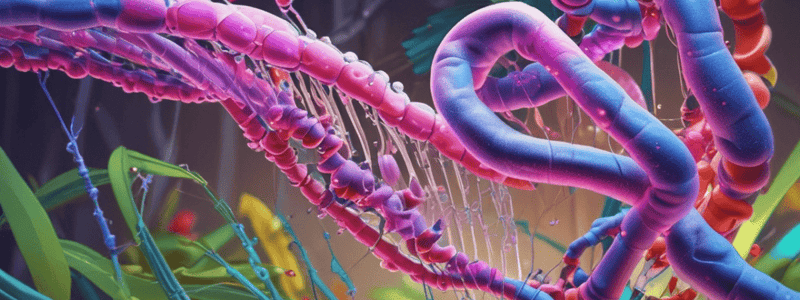Podcast
Questions and Answers
Which of the following is NOT one of the fundamental principles of biotechnology mentioned in the text?
Which of the following is NOT one of the fundamental principles of biotechnology mentioned in the text?
- Specificity
- Selectivity
- Controllability
- Reversibility (correct)
Which technique is used for creating identical copies of a gene or part of a chromosome?
Which technique is used for creating identical copies of a gene or part of a chromosome?
- CRISPR gene editing
- Genetic manipulation
- Fermentation
- Polymerase chain reaction (PCR) (correct)
Which of the following is NOT mentioned as an application of biotechnology in the text?
Which of the following is NOT mentioned as an application of biotechnology in the text?
- Improving industrial efficiency
- Developing biofuels
- Remediating environmental pollutants
- Enhancing computer processing power (correct)
What is the process of large-scale production of proteins or other valuable products through the cultivation of genetically modified microorganisms called?
What is the process of large-scale production of proteins or other valuable products through the cultivation of genetically modified microorganisms called?
Which of the following is a principle of biotechnology that ensures the safety of genetically modified organisms from environmental and human health standpoints?
Which of the following is a principle of biotechnology that ensures the safety of genetically modified organisms from environmental and human health standpoints?
Which of the following techniques is used to modify genes by making precise changes to DNA sequences?
Which of the following techniques is used to modify genes by making precise changes to DNA sequences?
What is the principle of biotechnology that ensures accuracy and precision by targeting specific traits or characteristics?
What is the principle of biotechnology that ensures accuracy and precision by targeting specific traits or characteristics?
Which of the following is NOT mentioned as a process involved in biotechnology?
Which of the following is NOT mentioned as a process involved in biotechnology?
Which of the following is an application of biotechnology in the healthcare industry?
Which of the following is an application of biotechnology in the healthcare industry?
Which principle of biotechnology ensures that many cells can be transformed with the engineered DNA?
Which principle of biotechnology ensures that many cells can be transformed with the engineered DNA?
What is the primary technique used to modify an organism's genetic material in genetic engineering?
What is the primary technique used to modify an organism's genetic material in genetic engineering?
Which step in the genetic engineering process involves cutting DNA at specific points using enzymes?
Which step in the genetic engineering process involves cutting DNA at specific points using enzymes?
What is the primary function of the ligase enzyme in the genetic engineering process?
What is the primary function of the ligase enzyme in the genetic engineering process?
Which type of organism is commonly used as a host for the introduction of engineered DNA in genetic engineering?
Which type of organism is commonly used as a host for the introduction of engineered DNA in genetic engineering?
What is the primary goal of genetic engineering?
What is the primary goal of genetic engineering?
Which principle is fundamental to the process of genetic engineering?
Which principle is fundamental to the process of genetic engineering?
What is a potential application of genetic engineering in agriculture?
What is a potential application of genetic engineering in agriculture?
Which statement accurately describes the process of restriction digestion in genetic engineering?
Which statement accurately describes the process of restriction digestion in genetic engineering?
What is a potential application of genetic engineering in medicine?
What is a potential application of genetic engineering in medicine?
Which statement accurately describes the process of ligation in genetic engineering?
Which statement accurately describes the process of ligation in genetic engineering?
Flashcards are hidden until you start studying
Study Notes
Understanding Biotechnology: Genetic Engineering, Principles, and Applications
Biotechnology refers to the application of living organisms, cells, parts or products to improve our lives. It involves manipulating genes and gene products to create products that solve problems, improve health, and promote sustainable growth. The field encompasses a broad range of applications and technologies, including genetic engineering, principles, and processes. Let's explore these areas in more detail.
Genetic Engineering
Genetic engineering is the process of modifying an organism's genome or genetic material. This is typically accomplished through recombinant DNA technology, a technique used to combine DNA segments from different species. Here are some key steps in the genetic engineering process:
- Isolation of DNA: Scientists isolate the specific section of DNA containing the desired trait or gene.
- Restriction Digestion: Enzymes called restriction enzymes cut the isolated DNA at specific points, creating sticky ends that can join with complementary sections of DNA from another organism.
- Ligation: The cut edges of the DNA molecules are joined together using a ligase enzyme, forming a recombinant DNA molecule.
- Introduction into Host Organism: The engineered DNA is introduced into a host organism, such as bacteria or plants, which allows the modified gene to be expressed and produce the desired product.
Principles of Biotechnology
Some fundamental principles guide the field of biotechnology:
- Specificity: Genetic modification targets specific traits or characteristics, ensuring accuracy and precision.
- Selectivity: The process is designed to selectively modify specific DNA sequences without affecting others.
- Controllability: Genetic engineering provides control over the expression of genes, allowing scientists to regulate when and where desired traits are expressed.
- Efficiency: Modern techniques strive for high efficiency, ensuring many cells can be transformed with the engineered DNA.
- Safety: Ensuring the safety of genetically modified organisms from both environmental and human health standpoints is paramount.
Processes in Biotechnology
Biotechnological processes involve several stages, including:
- Cloning: Creating identical copies of a gene or part of a chromosome using molecular biology techniques like polymerase chain reaction (PCR) or restriction enzyme digestion.
- Genetic manipulation: Modifying genes using techniques like CRISPR gene editing, which allows precise changes to DNA sequences.
- Fermentation: The large scale production of proteins or other valuable products through the cultivation of genetically modified microorganisms.
Applications of Biotechnology
Biotechnology has wide-ranging applications across various industries:
- Healthcare: Developing diagnostic tests, vaccines, and medications using engineered organisms or synthetic biology approaches.
- Agriculture: Enhancing crop yield and resistance to diseases by modifying plant genomes.
- Environment: Remediating environmental pollutants, developing biofuels, and addressing climate change.
- Industrial processes: Improving industrial efficiency and reducing waste through biological processes.
As biotechnology continues to evolve, its potential for solving complex problems and advancing our society is vast. However, it is essential to approach this field with caution, considering its ethical implications and ensuring that its applications are safe and sustainable.
Studying That Suits You
Use AI to generate personalized quizzes and flashcards to suit your learning preferences.





